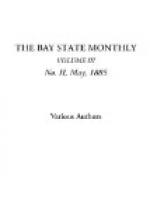This Court, understanding by the petition of Thomas Noyes, John Haynes of Sudbury, and Nathaniel Treadaway of Watertown, hereunto affixed, that there is a meete place for a Plantation about ten miles from Marlborow, westward, at or neer Quansetamug Pond, which, that it may be improved for that end, and not spoiled by the grantinge of farms, in answer to the forsaid petition, This Court doth order, that there should he a quantitie of eight miles square layd out and reserved thereabout, in the Courts dispose, for a plantation, for the encouragement of such persons as shall appear, any time within three years from the date hereof, beeing men approved by this Court; and that Capt. Edward Johnson, Lieut. Joshua Fisher, and Lieut. Thomas Noyes, shall, and are herby appointed and empowered to lay out the same, and to be payd by such persons as shall appear within the terme above expressed. The Deputies have passed this with reference to the consent of our honored Magistrates hereto.
William Torrey clerk
The Magistrates consent to a survey of the place petitioned for, and that Capt. Gookin doe joine with those mentioned of our brethren the deputies, and make return of their survey to the next General Court of Elections, who may take order therein as they shall see meete, their brethren the deputies hereto consenting.
Edward Rawson Sect’y.
William Torrey Cleric. Consented to by the deputies.
[Illustration: First universalist church.]
[Illustration: First unitarian church.]
[Illustration: Plan of Worcester 1673 to 1675.]
At that time several persons occupied lands that had been granted them, and built houses. This infant settlement was strangled almost at its birth by the outbreak of King Philip’s War, which spread in that year throughout Massachusetts. The colonists, few in number, and without adequate means of protection against the hostile savages, soon abandoned their buildings, which were burned by the Indians, December 2, 1675. In 1684 some of the former proprietors returned to their lands, accompanied by new settlers, and a second plantation was formed; this time under the name of Worcester. The records relating to the fortunes of this plantation are very meagre; but it continued to exist till 1700, or 1702, when, during the progress of the French and Indian hostilities, owing to its exposed position, it was again deserted by its inhabitants. One man only, Digory Serjent, remained with his family, refusing to give up to the Indians the fields his labor had brought under cultivation. For a time he was unmolested. The authorities sent messengers to warn him of the danger he incurred by his rash course, and to advise his removal with his family to a place of safety. But the warning




